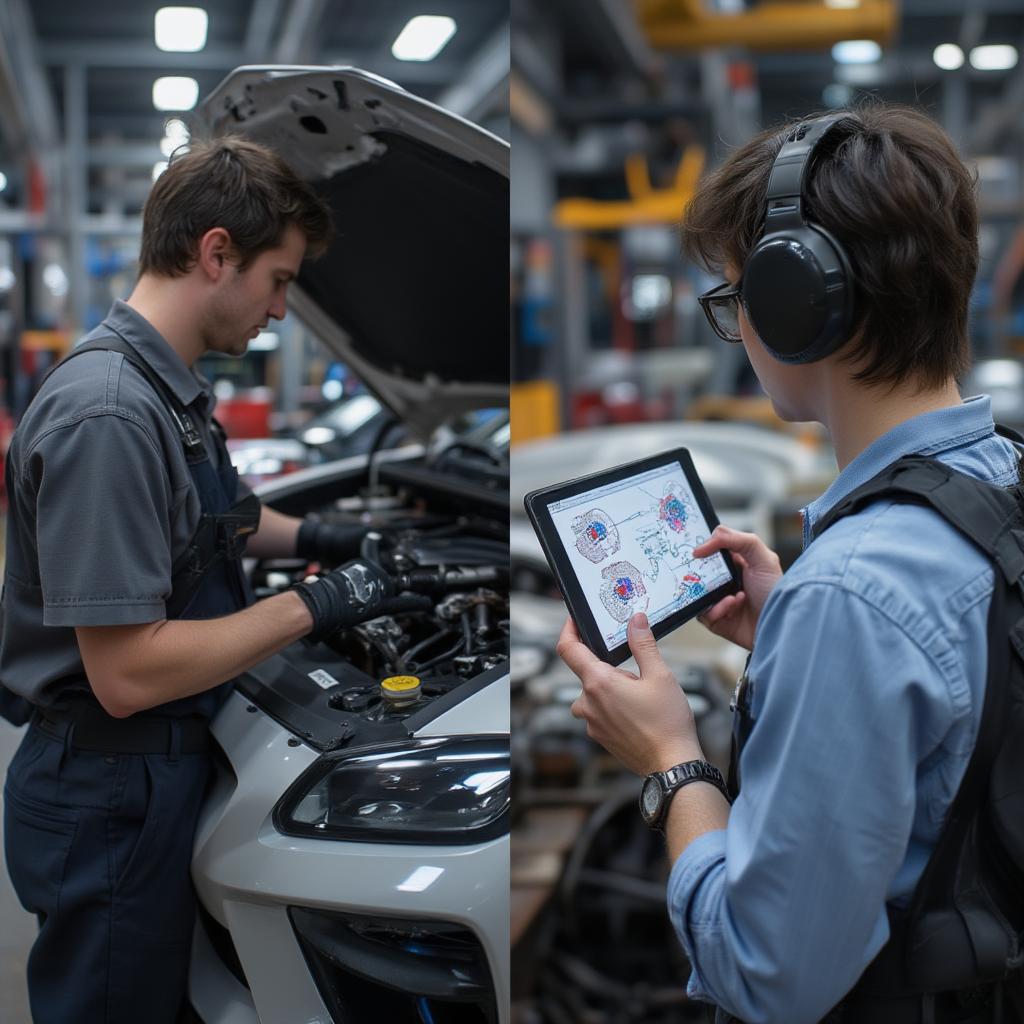Cert 1 Automotive: Your Gateway to a Thriving Automotive Career

Diving into the world of automotive technology can be both thrilling and rewarding. A Cert 1 Automotive qualification is often the first step for many aspiring mechanics, technicians, and automotive professionals. This foundational certification provides the essential knowledge and skills required to excel in this dynamic industry. From understanding basic vehicle systems to performing routine maintenance, a Cert 1 Automotive program sets the stage for a successful career journey in automotive repair and service.
What Exactly is a Cert 1 Automotive Qualification?
A Cert 1 Automotive qualification is typically an introductory course designed to provide a broad overview of the automotive industry. Unlike advanced certifications that focus on specific areas, this entry-level program covers fundamental aspects such as:
- Basic Vehicle Systems: Understanding the workings of engines, transmissions, brakes, and electrical systems.
- Safety Procedures: Learning essential safety practices in a workshop environment.
- Tool Usage: Familiarizing oneself with common automotive tools and equipment.
- Routine Maintenance: Performing basic services like oil changes, tire rotations, and fluid checks.
- Workshop Practices: Developing skills in efficient and organized workshop management.
This certification is the building block for many other automotive qualifications. It’s a crucial step for anyone wanting to pursue a career in auto repair, as it provides a solid base of knowledge. A good analogy would be the foundation of a house: without it, the entire structure would crumble. Similarly, skipping this foundational qualification can make it more challenging to grasp more complex automotive concepts later on.
Why Start with a Cert 1 Automotive?
Many people often wonder why they should begin with a Cert 1 Automotive rather than jumping straight into more advanced or specialized training. Here are several compelling reasons:
- Foundation of Knowledge: It provides the necessary fundamental knowledge to understand how vehicles function.
- Hands-on Experience: Cert 1 Automotive courses often include practical, hands-on training that is crucial for skill development.
- Career Pathways: This qualification can open doors to various entry-level positions in the automotive industry.
- Prepares for Further Study: It sets you up for higher-level certifications and more specialized training in the future.
- Industry Recognition: Cert 1 Automotive is recognized across the industry as a baseline qualification.
This is the perfect point of entry for anyone with a passion for cars and an interest in working within the automotive field. According to automotive training expert, Dr. Alistair Finch, “A Cert 1 qualification provides the foundational knowledge necessary for understanding complex automotive systems. It’s not about just fixing cars; it’s about understanding how they work from the ground up.” This basic but essential understanding, therefore, becomes the bedrock for further expertise.
Where Can I Get a Cert 1 Automotive?

Numerous vocational schools and community colleges offer Cert 1 Automotive programs. When choosing a training provider, consider factors such as:
- Accreditation: Make sure the program is accredited and recognized by industry bodies.
- Instructors: Check the credentials and experience of the instructors.
- Curriculum: Review the curriculum to see if it covers all the key areas of automotive technology.
- Hands-on Training: Look for programs that prioritize practical training and workshop experience.
- Resources: Confirm the availability of modern tools, equipment, and learning resources.
You can explore colleges with automotive technology programs to find a suitable training center near you. A thorough search online and visiting the facilities can provide valuable insights into the quality and fit of the program.
What Skills Will I Gain from Cert 1 Automotive?
The Cert 1 Automotive qualification equips students with a range of essential skills, including:
- Basic Diagnostics: Identifying common vehicle problems.
- Routine Maintenance: Performing tasks like oil changes, fluid top-ups, and tire rotations.
- Tool Proficiency: Using common automotive tools and equipment safely and effectively.
- Safety Practices: Adhering to safety protocols in a workshop environment.
- Technical Documentation: Reading and understanding service manuals and technical guides.
These foundational skills are vital for succeeding in the automotive industry. Imagine a scenario where you can confidently perform a full service on your car and explain the process to a friend. That’s the kind of confidence and know-how that a Cert 1 Automotive qualification provides. “The ability to troubleshoot and understand basic mechanics is essential for any budding automotive technician, and that’s exactly what a Cert 1 qualification delivers,” says Eleanor Vance, a senior automotive instructor at a top training center.
How Does Cert 1 Automotive Lead to Career Opportunities?
Completing a Cert 1 Automotive qualification opens doors to numerous entry-level positions in the automotive industry. Some common job roles include:
- Apprentice Mechanic: Working under the guidance of experienced mechanics.
- Service Advisor: Assisting customers with their service needs.
- Parts Assistant: Managing and organizing automotive parts.
- Entry-Level Technician: Performing basic maintenance and repairs.
- Detailing Specialist: Maintaining the cleanliness and appearance of vehicles.
These roles are crucial in the automotive sector and provide great opportunities to grow and learn. Starting at the entry level gives you hands-on experience that you can carry through your entire career.
What is the Path After Cert 1 Automotive?
The journey does not end with a Cert 1 Automotive qualification. It is often a stepping stone to more advanced certifications, specializations, and higher-level education. After obtaining your certificate, you might consider:
- Cert 2 Automotive: Building upon your foundational knowledge with more advanced training.
- Specialized Training: Focusing on specific areas like engine repair, electrical systems, or bodywork.
- Diploma or Associate Degree: Pursuing higher education in automotive technology.
- Bachelor of Science in Industrial Technology Major in Automotive: For those seeking a degree-level qualification and management roles. You can find more about this at bachelor of science in industrial technology major in automotive.
- Advanced Automotive Engineering: Pursuing a career in research, development, and innovation in the automotive industry.
Your journey depends on your goals and interests within the field. Choosing to continue your studies allows you to climb the ranks and to hone the specific skills you are passionate about.
How Long Does a Cert 1 Automotive Course Take?
The duration of a Cert 1 Automotive course varies based on the provider and curriculum. However, most programs typically run for:
- Full-time Courses: Approximately 6 months to 1 year.
- Part-time Courses: Up to 2 years.
- Intensive Courses: Shorter durations of a few weeks or months.
It’s essential to research the available programs and select a schedule that suits your needs and lifestyle. The time investment is a long-term investment into your career and potential within the automotive industry.
The Future of Cert 1 Automotive Training
As technology advances, the automotive industry is constantly evolving. This includes advancements in training. Cert 1 Automotive programs are adapting by incorporating:
- Virtual Reality (VR): Using simulations to provide hands-on experience without physical constraints.
- Online Learning Platforms: Allowing more flexibility and accessibility for learners.
- AI-Driven Tools: Using artificial intelligence to personalize learning and track student progress.
- Hybrid Training Models: Blending online and in-person training for an integrated approach.
- Focus on Electric and Hybrid Vehicles: Integrating new technologies into the curriculum as the industry shifts towards electric and alternative fuel vehicles.
These advancements ensure that Cert 1 Automotive graduates are well-prepared for the challenges and opportunities that the future holds.
How to Choose the Right Cert 1 Automotive Program for You?
Choosing the right program is crucial for your success in the automotive industry. Here are some tips to help you make the right decision:
- Research: Investigate different training providers and their programs.
- Compare: Look at factors like accreditation, cost, and curriculum.
- Visit: If possible, visit the training facilities and talk to instructors.
- Read Reviews: See what past students have to say about the program.
- Ask Questions: Don’t hesitate to ask questions about any concerns or queries you may have.
Making an informed choice will help you find a Cert 1 Automotive program that is the right fit for you. Consider your long-term goals and make a selection that will best set you up for a successful future.
Real-World Success Stories from Cert 1 Graduates
Graduates of Cert 1 Automotive courses go on to achieve great things in the industry. Let’s take a quick glance at some hypothetical success stories:
- Sarah, a mechanic at a dealership: “The skills I learned during my Cert 1 course enabled me to confidently tackle various maintenance and repair tasks. I am now pursuing further certifications to advance my career.”
- John, an automotive service advisor: “My Cert 1 gave me a comprehensive understanding of how cars work, which is crucial when explaining issues to customers. It’s the perfect stepping stone.”
- Emily, a parts assistant: “Thanks to my Cert 1 training, I understand the significance of every part and how it fits into the bigger picture of vehicle maintenance. I can efficiently manage the parts and inventory.”
These stories highlight the real-world impact of obtaining a Cert 1 Automotive qualification and how it sets people on a solid career path.
Getting Started with Your Cert 1 Automotive Journey
If you are eager to kickstart your career in the automotive industry, obtaining a Cert 1 Automotive is the best first step. It provides the knowledge and skills necessary to work as a mechanic or technician. For those looking to get a more hands on approach to learning, you can also check out car mechanics courses for beginners. This qualification isn’t just about getting a certificate; it is about embarking on a journey into a dynamic and rewarding career. Start exploring your options and take that step toward your future in the world of automotive technology.
Conclusion
A Cert 1 Automotive qualification serves as a crucial foundation for anyone aspiring to a career in the automotive industry. It equips students with fundamental knowledge, practical skills, and the ability to tackle various roles in this diverse field. By focusing on the basics, it sets you up for success in more advanced certifications and specializations. Consider starting your journey with a Cert 1 Automotive and unlock your full potential in the automotive world.
FAQ about Cert 1 Automotive
-
What is the main focus of a Cert 1 Automotive course?
- A Cert 1 Automotive focuses on teaching the basic fundamentals of car maintenance, repair, safety, and workshop practices. This includes everything from oil changes and tire rotations to understanding essential safety procedures.
-
Do I need prior automotive experience to enroll in a Cert 1 Automotive course?
- No, prior automotive experience is not typically required. These courses are designed for beginners and those looking to start a career in the automotive industry.
-
What are the common entry-level jobs available after completing Cert 1 Automotive?
- Entry-level jobs can include roles such as apprentice mechanic, service advisor, parts assistant, or entry-level technician, among others, which are vital in supporting various facets of the automotive repair and maintenance fields.
-
How long does it usually take to complete a Cert 1 Automotive course?
- Course duration can vary depending on the provider, but most full-time courses typically take 6 months to 1 year to complete, while part-time courses can take up to 2 years.
-
Are there opportunities for further education or specialization after a Cert 1 Automotive?
- Yes, a Cert 1 Automotive is often a stepping stone to advanced certifications, specializations like engine repair, and further studies like diplomas, associate degrees, and even bachelor’s degrees in related fields.
-
What are the key skills gained from a Cert 1 Automotive course?
- Key skills include basic diagnostics, routine maintenance, safe tool use, technical documentation, and adherence to workshop safety practices, setting a firm foundation for work in the automotive sector.
-
What are some of the new technologies being integrated into Cert 1 Automotive training?
- New technologies include virtual reality (VR) training simulations, AI-driven tools to personalize learning, and hybrid training models to support the shift towards electric and alternative fuel vehicles.
-
Is Cert 1 Automotive recognized in the industry?
- Yes, Cert 1 Automotive is recognized across the industry as a baseline qualification, demonstrating that an individual has the required basic knowledge and skills to start a career in the automotive field.
-
Can a Cert 1 Automotive help me if I am interested in auto body work?
- While Cert 1 Automotive focuses primarily on mechanical systems, it does provide foundational knowledge that can be beneficial for understanding the basic structure of a vehicle, and can serve as a precursor for additional training in auto body training near me.




